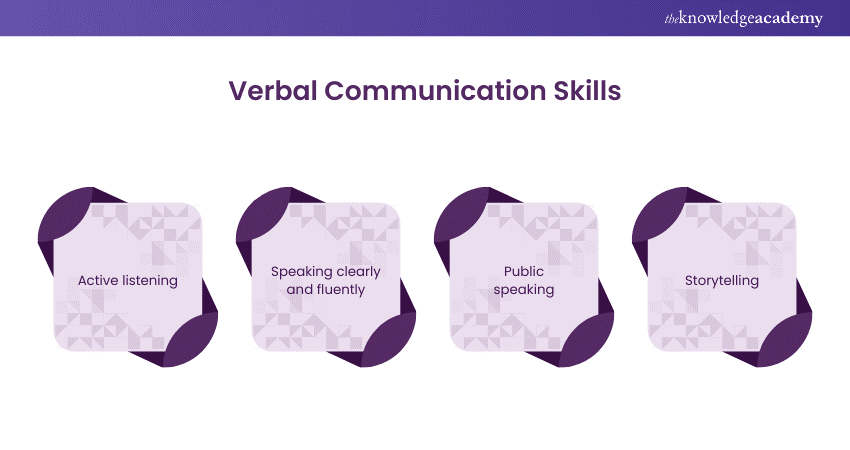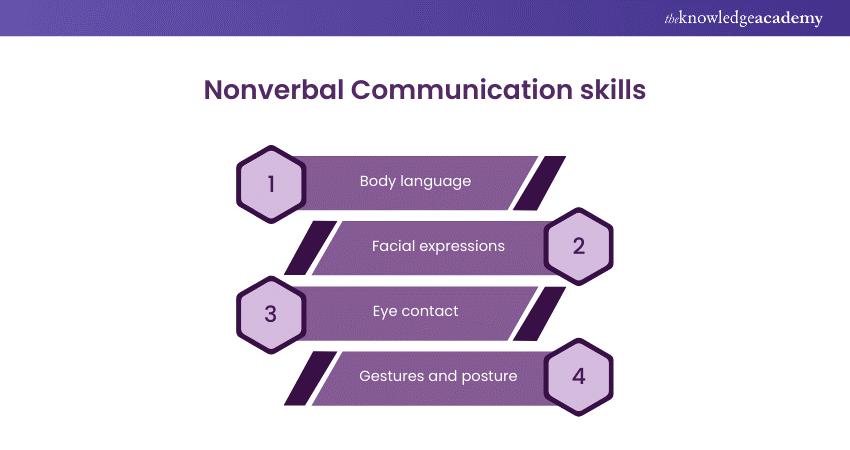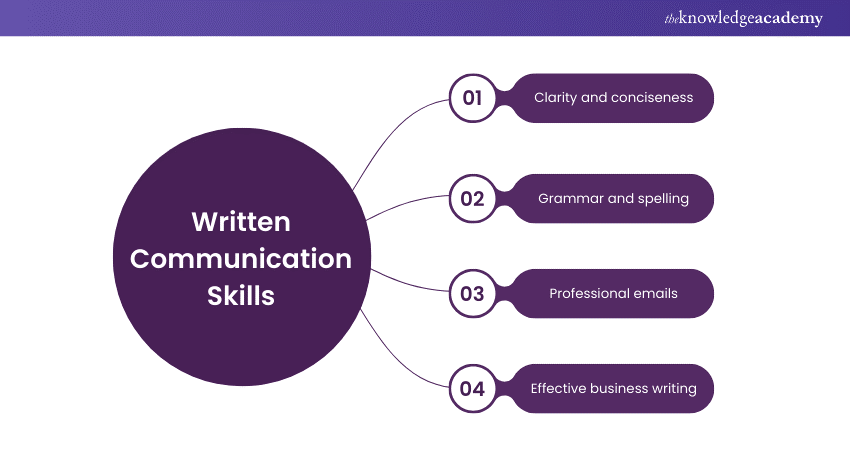We may not have the course you’re looking for. If you enquire or give us a call on 01344203999 and speak to our training experts, we may still be able to help with your training requirements.
We ensure quality, budget-alignment, and timely delivery by our expert instructors.

Have you ever had the urge to reconnect with a childhood buddy and tell them you miss them? You should! They probably miss you too, and it is important that we communicate how we feel. Are you wondering what would be the best way to communicate with your long-lost buddy? Maybe an understanding of the Types of Communication might help.
Choosing the right types of communication to get your messages across is crucial to the process, as there are advantages and disadvantages of communication skills. You wouldn’t want to email your mother that you love her or send an informal text to your boss regarding important and classified information. So, get ready and explore the various Types of Communication you can use.
Table of Contents
1) The importance of Communication Skills
2) Four Main Types of Communication Skills
a) Verbal Communication
b) Nonverbal Communication
c) Written Communication
d) Visual Communication
3) Conclusion
The importance of Communication Skills
Imagine a world without communication, no words, no action, no language and no means to express oneself! Sounds bizarre, doesn’t it? How would you go about our day-to-day life without communicating with each other?
Communication is a fundamental for living, there is not a task in the world that can be completed without communication. Additionally, communication helps us be aware of our environment, and make progress towards tomorrow.
Looking at the business aspect, while you apply for a job, the first thing that represents you is your communication skills. Every company wants their employees to have excellent communication skills as it will increase the efficiency of their employes as they can communicate smoothly with each other.
Four Main Types of Communication Skills
There are many different ways one can communicate with another individual which predominantly classified into four main types namely verbal, non-verbal, written and visual . Let's understand these four types a little better by looking at each of them in detail. Are you ready? Let’s get right to it...
Verbal Communication Skills
Verbal Communication Skills is the foundation of human interaction, allowing us to express thoughts, share ideas, and connect with others through spoken words. To master the Verbal Communication Skills, you need to acquire the following skills:

a) Active listening
Active listening is beyond simply hearing words. It involves fully engaging with the speaker, understanding their perspective, and responding thoughtfully. With genuine interest and empathy, active listeners develop a deeper connection and avoid misunderstandings.

b) Speaking clearly and fluently
Clear and fluent speech is crucial for conveying messages accurately. When we articulate our thoughts coherently, we can minimise the risk of confusion and ensure that others understand our intended meaning. Speaking fluently allows for smoother conversations and effective exchanges of information.
c) Public speaking
Public speaking is the art of addressing larger audiences with confidence and clarity. This skill is valuable in various contexts, from presenting ideas at work to delivering impactful speeches. Mastering public speaking involves managing nerves, structuring content, and engaging listeners.
d) Storytelling
Storytelling is one of the most powerful ways to communicate in the business world. Stories can help people relate to your organisation’s values and goals. If you want to strengthen your organisational culture, you can share a captivating and meaningful story about your organisation.
Further, it can show your vision in action and inspire others. Your organisational culture is shaped by you and your employees. So, use storytelling, along with Communication Aids, to express your ideas clearly and persuade your employees.
Nonverbal Communication Skills
Nonverbal Communication Skills is one of the most powerful Types of Communication Skills. It encompasses a rich range of nonverbal cues that enhance our messages and convey our thoughts, feelings, and intentions. Nonverbal Communication often speaks louder than words, shaping how others perceive us and how we interpret their messages. So, let's explore some of the key Nonverbal communication skills:

a) Body language
Body language is a key part of our day-to-day Communication. It consists of nonverbal signals such as facial expressions, eye contact, and posture. When you listen to someone, you should focus not only on their words but also on their body language.
Sit up straight, avoid fidgeting, and show them you are interested. Likewise, you should be aware of your own body language when you communicate so you can convey the right message to others.
b) Facial expressions
The face is a collection of emotions, revealing happiness, surprise, sadness, and more. A genuine smile can establish warmth and approachability, while furrowed brows might indicate concern. Being connected to other’s facial expressions allows us to understand their reactions and tailor our responses accordingly.
c) Eye contact
Maintaining appropriate eye contact demonstrates attentiveness and interest. Steady eye contact ensures connections and signifies respect. However, overly intense or avoidant eye contact can lead to discomfort. Striking the right balance is crucial to effective Communication.
d) Gestures and posture
Gestures add nuance to our words, emphasising points or adding emphasis. A nod can indicate agreement, while a finger to the lips may signal quiet. However, cultural variations can impact the interpretation of gestures, so sensitivity is key. Likewise, posture speaks volumes; standing tall exudes confidence while slumping conveys disinterest
Unlock your Communication potential; register for our Effective Communication Skills Course!
Written Communication Skills
Among the different Types of Communication Skills, the written word remains a crucial type of effective Communication, especially among professionals. Whether crafting emails, reports, or documents, possessing strong Written Communication Skills is valuable for conveying ideas clearly and persuasively. Here are some key skills to improve your Written Communication Skills:

a) Clarity and conciseness
The fundamentals of effective writing are clarity and conciseness. Readers appreciate well-structured content that gets to the point without unnecessary contexts. Avoid ambiguity by using simple language and organising your thoughts logically, and it enhances understanding and engagement.
b) Grammar and spelling
Proper grammar and spelling are non-negotiable in Written Communication. Errors can undermine your credibility and distract readers from your message. Proofreading and editing are essential; they help catch typos and grammatical mistakes and ensure that your writing is polished and professional.
c) Professional emails
Emails are a primary form of business Communication, and mastering the art of composing professional emails is crucial. Start with a clear subject line that reflects the content of the message. Use a salutation appropriate for the recipient's relationship and maintain a courteous tone throughout. Be succinct while conveying essential information, and always conclude with a clear call to action or next steps.
d) Effective business writing
Business writing encompasses a range of documents, from proposals to presentations. Effective business writing is addressed to your audience, presenting information in a way that is easy to understand and persuades the reader to take action. A well-structured report or proposal conveys credibility and authority.
Register for our Business Communication Training and elevate your business communication skills.
Visual Communication Skills
This form of communication Skills is most often used to support other types of communication like verbal or written. It is also known as Visual aid. Visual Communication broadly reffers to images and infographics that help get the message across in a short and brief manner. Here are some key points to keep in mind when communicating via visuals:

a) Relevance
The visuals you provide to support your communicative process must be relevent to the subject matter. Irrelevant images of infographics can mislead the direction of communication and deviate the attention of the receiver.
b) Simplicity
The simpler the visuals the better the receiver comprehends it. Complex visuals can confuse the reader and lead to misinterpretations of the topic being addressed.
c) Colours and aesthetics
The colour pallet and the aesthetics used to create the visuals, must be easy on the eyes. They must complement each other yet contrast to a certain degree to avoid merging into each other as they may cause confusion.
d) Readability
If your visuals include words, they must be legible. If the receiver is having a hard time reading the visual aid, they may be distracted from the conversation about it and may miss out on important information.
Conclusion
Mastering various Types of Communication Skills is not only a valuable skill but an absolute necessity. Whether you're navigating face-to-face conversations, crafting emails, engaging online, or connecting across cultures, effective Communication underpins success. This blog took you through all the major aspects of the different Types of Communication. Now, when preparing for Subject Matter Expert Interview Questions, understanding how to communicate effectively is key. It’s time for you to reach out to your old buddy and tell them you miss them.
Become a Master of Communication; Register for our Communication Skills Courses!
Frequently Asked Questions
How can enhancing Verbal Communication Skills impact self-confidence?

Enhancing Verbal Communication Skills can impact self-confidence by empowering you to speak out, express your thoughts and feelings, and influence others. Verbal Communication Skills can help you build rapport, understand others’ perspectives, and handle conflicts. These abilities can boost your self-esteem and your personal and professional success.
Why is feedback important for getting better at Communication?

Feedback is important for improving Communication because it helps you evaluate your strengths and weaknesses, identify areas of improvement, and adjust your Communication style accordingly. Feedback can also help you understand how others perceive your message, avoid misunderstandings, and improve relationships.
What are the other resources and offers provided by The Knowledge Academy?

The Knowledge Academy takes global learning to new heights, offering over 3,000 online courses across 490+ locations in 190+ countries. This expansive reach ensures accessibility and convenience for learners worldwide.
Alongside our diverse Online Course Catalogue, encompassing 19 major categories, we go the extra mile by providing a plethora of free educational Online Resources like News updates, Blogs, videos, webinars, and interview questions. Tailoring learning experiences further, professionals can maximise value with customisable Course Bundles of TKA.
What is the Knowledge Pass, and how does it work?

The Knowledge Academy’s Knowledge Pass, a prepaid voucher, adds another layer of flexibility, allowing course bookings over a 12-month period. Join us on a journey where education knows no bounds.
What are related Communcation Skills Courses and blogs provided by The Knowledge Academy?

The Knowledge Academy offers various Communication Skills Courses, including Assertiveness Skills Training, Effective Communication Skills, Negotiation Skills Training and more. These courses cater to different skill levels, providing comprehensive insights into What is Storytelling.
Our Business Skills Blogs cover a range of topics related to Communication, offering valuable resources, best practices, and industry insights. Whether you are a beginner or looking to advance your Business Skills, The Knowledge Academy's diverse courses and informative blogs have you covered.
Upcoming Business Skills Resources Batches & Dates
Date
 Public Speaking Course
Public Speaking Course
Fri 11th Apr 2025
Fri 27th Jun 2025
Fri 22nd Aug 2025
Fri 24th Oct 2025
Fri 28th Nov 2025






 Top Rated Course
Top Rated Course


 If you wish to make any changes to your course, please
If you wish to make any changes to your course, please


